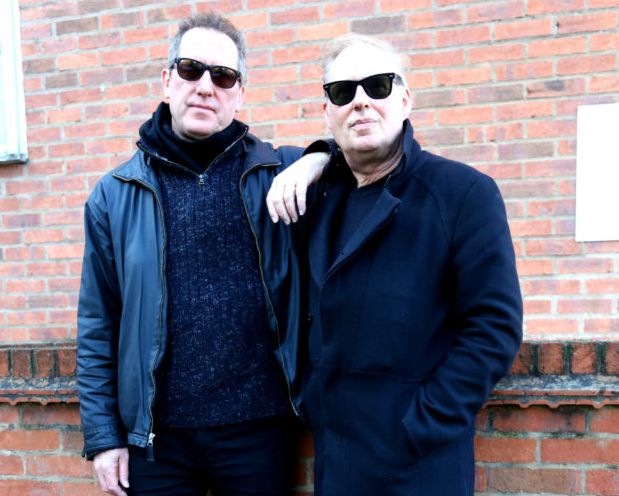OMD are full of surprises even now, from their sublime live performances to their extraordinary run of brilliant albums, the latest of which surely ranks amongst their finest ever. Main man Andy McCluskey caught up with me to talk about songs, shows and Cybermen. Read on…
God Is In The TV: Back in 1991, I saw you live for the first time, at Manchester’s Cities In The Park festival. I was bowled over, because although I liked OMD a lot, for some reason I didn’t expect you to be very exciting in concert, yet you turned out to be one of the best live acts I’d ever seen. And then a few days ago, I saw you at De Montfort Hall in Leicester, which I’d actually rate as one of the top five best shows I’ve ever attended. And you were performing with septic tonsillitis! What gives you the drive to get through a show like that in such a determined manner?
Andy McCluskey: Having 2,000 people in front of me! That would be the simple answer anyway. I’ve been quite fortunate though, in that despite having had various illnesses over the past two weeks, I’ve always still been able to perform. The only tricky part is trying to stay “in the moment” when you’re not feeling too well. But I know we’ve got a good show, a great band, good lights, and that the package can still be delivered, even if I don’t. I think you hit the nail on the head there with what you said about the 1991 show – often, people who haven’t seen us live before just presume we’re going to be this pseudo-intellectual band just standing behind our instruments, but when those people actually DO eventually see us perform, they realise how much energy, passion and warmth there is to us, and they end up coming back. Leicester was a great show. I saw this guy clapping wildly in front of the barriers by the stage out of the corner of my eye and thought “Who IS this? Is it security?” and then I realised it was your photographer! I’ve never seen that happen before, ever, and it was really nice to see.
The Punishment Of Luxury is an astonishing album. Our reviewer even conveyed his surprise at HOW good it was by comparing it with Leicester City winning the Premier League. You do hear of some bands, for example Pulp with ‘Common People’, where they said as soon as they’d finished it and heard it back for the first time, they knew they had a huge hit record on their hands. When you heard THIS album back for the first time, did you realise that you’d created a masterpiece that was going to resonate with critics and public alike?
AM: I think, the way records are made now is a bit different. Everything is written in a box on a computer these days, and songs develop gradually over time before they become the finished product. So the days of us all standing back to hear the final playback is a thing of the past now, but we trusted ourselves – trusted each other – to make something worthwhile. Our record company wanted us to put something out last year, but we’ve been more objective about it than we have in the past, and there were still a few things that we felt needed ironing out on those songs before we were willing to put them out. There was no way we were going to be releasing anything unless we felt it was a strong album ourselves. And the general response has made us feel we were right to take that approach. We feel like we gave our fans something worth their time.
I feel like you’re a band who have always embraced technology, both in the music you make and the lyrics you write, but I can’t help feeling that it seems to have a far more ominous, ‘Brave New World’ kind of undercurrent than ever before, as though, whilst you are in awe of the advances made in that particular field, you are also fearful that those machines are the very things that are beginning to destroy us. ‘La Mitrailleuse’, in particular, feels positively apocalyptic…
AM: We have, I think, always been fascinated by that interface of humans and machinery. It’s kind of ‘our sound’, if you like – that juxtaposition of mechanical patterns; machinery as a foil for the human emotion. We like to address those issues. You’re absolutely right though, as ‘La Mitrailleuse’ has a specific reference to World War One, which was where we tragically witnessed the first mechanised slaughter of human beings.
Having been born – just – in the 1950s, I come from an age that was very excited about the post-war advancements made in technology and medicine, and of course there HAVE been lots of wonderful things, but also a lot of negatives. I mean, we’re living on the threshold of a real radical time, one where algorithms and AI’s can dramatically affect the world. And we need to look at that geopolitical framework, because the way it’s going, we’re going to end up with just a select few people running the world through programs and advanced technology, while an awful lot of the rest of us will be forced to live on the minimum wage or be made redundant.
I actually thought ‘What Have We Done?’ was a reflection upon that kind of thing, specifically the Brexit decision, but it turns out it was about Paul having to have his dog put to sleep…
AM: I think Paul’s dog dying was the catalyst for an avalanche of feelings and emotions, especially as the dog was the last remaining remnant of a relationship he had which ended a few years back. There is a lot of sadness in that song, about all sorts of things. We loathe Trump, and we are strong Remainers, so there may well be a bit of that in there too. I mean, a popular global franchise is a beautiful idea if you can pull it off, but sadly a lot of people have been easily manipulated and persuaded by what was a pack of lies, while our politicians are utterly disconnected from the real world. Paul and I were horrified by the Brexit vote, and I wake up every morning just PRAYING that there will be another vote where the decision will be reversed.
There are at least 48% of us who feel that way…
AM: I think there would be a lot more than that now, when you consider there were a lot of people who didn’t vote because they didn’t deem it necessary, then there are the ones who did it as a protest vote, and also of course there are those who are now aware they were duped and regret their decision. I live in hope that the second referendum will come, and that everyone has come to their senses now.
On a happier note, I was reading a book about Top Of The Pops earlier on, where I read a quote from you in which you said “The stages were held together with gaffer tape and our shoes stuck to them”, which made me laugh…
AM: Yeah, the Top Of The Pops studios looked a lot more sparkly, larger, and a lot less dingy on television! But of course, it was still the show that everyone wanted to be on. If you got the late camera call though, you could end up having to stay there for ten hours just to perform your three minute song and they wouldn’t let you leave! You couldn’t go anywhere, and the only place you could eat was the BBC canteen. It was funny though, because if you were there at the same time they were filming a period drama, or Dr Who, you could quite easily find yourself sitting with some cybermen over lunch, which happened to us once!
You had a very unexpected change of direction at one point, where you went off and did the Atomic Kitten thing (NB = McCluskey wrote the group’s number one smash ‘Whole Again’ and several of their other hits). You and Paul have known each other since you were kids. Was he supportive of you when you did that?
AM: We weren’t really communicating much at that point. Paul and I’s relationship…it is what it is, I guess. We’re very different people, but we know we bring out the best in each other. The Atomic Kitten thing, yeah, that was quite an unusual episode in my career. It made me realise that the manufactured pop side of things is unbelievably dirty – I learned a lot about the music industry at that time, how greedy it was and how much backstabbing goes on in that particular area. Everyone’s in it just to try to make sure their slice of the pie is bigger, and making records is nothing to do with the quality of the songs on an album; often bands or singers will record a song that they KNOW isn’t great purely because it’ll make one particular person a lot of money.
Still, the first album was good fun to make – I think we had about six hit singles from it – before management tore up my contract for one reason or another, and legal proceedings meant that I wasn’t able to speak to the girls from the band for four years, which I was very sad about; they were great girls.
What’s the best thing you’ve ever done, do you think?
AM: Falling in love with someone who was also in love with me. That was just the most beautiful feeling.There you go, a nice non-musical answer for you!
And what better way to end the interview than with such a nice answer from one of the nicest guys in music? If you haven’t heard The Punishment Of Luxury yet, by the way, I would heartily suggest you make it your next purchase, or at least grovel to Santa. It really is magnificent.

Photo credit: Paul Reno




